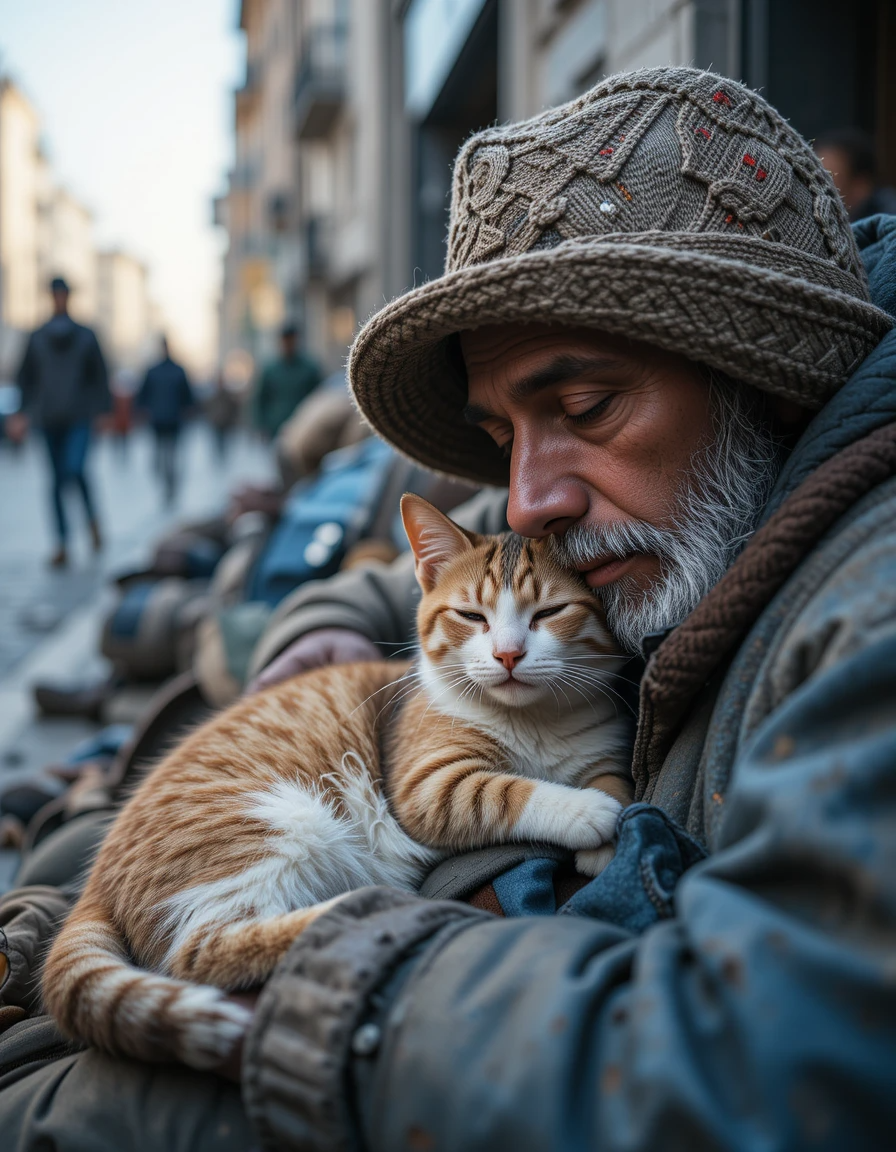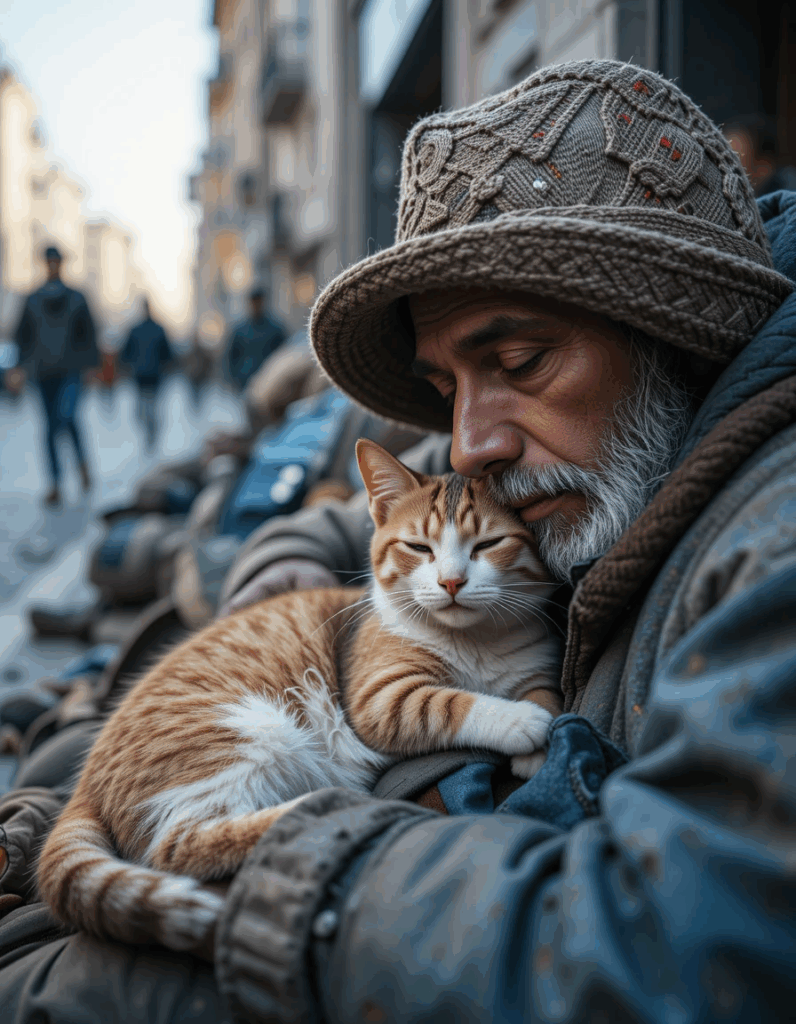He Had No Place to Go—No Family, No Future—Except for the Cat Who Slept on His Chest Every Night. “She Picked Me,” He Said. “And That’s All I’ve Ever Needed.”
I first spotted him outside the all-night laundromat, stretched out on a torn camping mat like it was luxury bedding. On his chest lay a scrappy orange cat—small, scarred, and missing part of an ear—rising and falling gently with his every breath.
He looked peaceful, but time had clearly worn him down. His shoes were patched with duct tape, and his belongings fit inside a crinkled trash bag. He carried the air of someone the world had stopped noticing.
I began leaving them little things from the café where I worked the graveyard shift—day-old muffins, leftover soup, the occasional sandwich that never got claimed. He never asked. Just smiled softly, said thank you, and always made sure the cat ate before he did.
One night, I finally sat down beside him and asked, “What’s her name?”
He scratched behind her torn ear and said, “Hazel.”
Then added, “She picked me. That’s what counts.”

Over time, his story came out in fragments. How his brother had cut contact. How his mother passed away three winters ago—alone. How he’d tried staying at shelters, but they wouldn’t allow pets. So he stayed out in the cold… for Hazel.
“She’s my reason,” he murmured once, almost to himself. “As long as she’s alright, I’ll be alright.”
Then one week, he was gone.
Three days went by. No sign of him. No Hazel. No sleeping mat. Just bare concrete and a draft where they used to be.
I asked around. Someone mentioned a cleanup crew had cleared out the sidewalk a few nights back. No one knew where he went—or what happened to the cat.
Then, this morning, as I headed to work, something caught my eye near the bus stop.
Hazel.
Alone.
She was thinner, and her fur looked dull, but it was her—no mistaking that half-missing ear and the calm way she watched me, like she’d been waiting for me to notice.
I froze. Crouched down slowly, heart pounding. I was afraid she’d run—but she didn’t. She walked right up to me and rubbed her cheek against my leg.
“Where is he?” I whispered, even knowing she couldn’t answer.
I lifted her gently. She felt lighter than she should, but she melted into my arms, tucking her face under my chin like she remembered me.
I skipped work and took her home. Wrapped her in a soft towel and let her nap in a laundry basket padded with an old sweatshirt. She slept like she hadn’t rested in days.
I called shelters, hospitals, animal control—anyone who might know something. Describing him without a name felt hopeless.
“Maybe mid-forties, kinda scruffy, always had an orange cat named Hazel with him,” I repeated, over and over.
No luck.
The laundromat remained empty. Like they’d both been erased.
So I kept Hazel. What else could I do?
I bought food, a litter box, scheduled a vet visit. That night, she curled up on the couch beside me. But it didn’t feel like she was mine. It felt like she was still waiting for him.
At the vet, we found a microchip—my heart leapt. Maybe we’d find a name, a clue, anything.
But it was registered under a low-cost clinic. No contact info. No updates. Just another dead end.
“She’s healthy,” the vet said. “Just needs some food and rest.”
Weeks passed. Hazel started to settle in. She’d nap in sunbeams and play with dust motes, but she still perked up every time we passed the laundromat.
Then, on a rainy Tuesday, while I was working a shift, a woman stepped into the café holding a soggy sign and a reusable shopping bag. Layers of clothes clung to her. Her hair was knotted, but her eyes were sharp.
She glanced around, then pointed at me.
“You used to sit with Martin, didn’t you?”
My heart skipped. “Martin?”
She nodded. “Yeah. Martin and Hazel. Everyone knew those two.”
I told her everything—his disappearance, how Hazel found me, how I’d been looking for him.
She looked down, then said, “He collapsed near the tracks. Someone called an ambulance. They took him to County General.”
I called the hospital immediately, this time with a name.
They had him.
He’d been unconscious for nearly two weeks. Severe pneumonia made worse by cold nights and no shelter. No ID. No emergency contact.
I left work and went straight there.
He was thinner. Paler. Hooked up to machines.
I sat beside him and talked. Told him Hazel was safe. That she hadn’t forgotten him. That she found her way back.
Three days later, his eyes opened.
His first word? “Hazel?”
I broke into a laugh and tears all at once. “She’s okay,” I promised. “She’s waiting.”
Rules were bent that day. The hospital made an exception.
I brought Hazel in.
She leapt onto his bed like she belonged there, curled against him, and closed her eyes.
He cried. Quietly.
“She found you,” he said.
“She never gave up,” I said. “Neither did you.”
He recovered slowly. Every day, he got a bit stronger. Hazel stayed with him during visiting hours. Slept at my place the rest of the time.
One day, he turned to me and said, “I didn’t think anyone would care.”
I smiled. “She cared. That was enough for me.”
When he was well enough, we helped him apply for transitional housing. I filled out forms, called charities, even made him an email.
A local nonprofit found him a tiny studio in a repurposed motel. Pet-friendly, clean, safe.
The day he moved in, Hazel waltzed in like she’d never lived anywhere else.
I helped him set up a few essentials. Donated furniture, clean sheets, a used kettle. Nothing fancy—but his eyes lit up.
“This is more than I ever thought I’d have again,” he said.
A few weeks later, something unexpected happened.
A woman showed up at the café asking for me. Late thirties, kind eyes. She introduced herself softly.
“I think you’ve been helping my uncle,” she said. “Martin.”
My heart stopped.
She hadn’t seen him in years—family drama, missed calls, lost chances. But she’d seen a photo of Hazel online, curled up in his new apartment. Someone had posted their story.
“I thought he was gone,” she whispered. “But I never stopped wondering.”
I gave her the address. They reunited the next day. It was quiet, a bit awkward—but something healed in that moment.
Martin now volunteers at the shelter that once turned him away. They changed their rules—pets are welcome now, thanks to him.
Hazel is still queen of their world.
And me? I visit sometimes. Bring coffee, leftover muffins. Let Hazel curl into my lap like old times.
Sometimes, the smallest acts create the biggest ripples.
A muffin. A name. A second chance.
Because one cat chose one man.
And that man never stopped choosing her back.
And now, he’s no longer alone.
So if you ever wonder whether what you do matters—remember this:
You might be someone’s reason to believe again.
Just like Hazel.
Just like Martin.
Just like hope—quiet, persistent, and waiting to be found.


